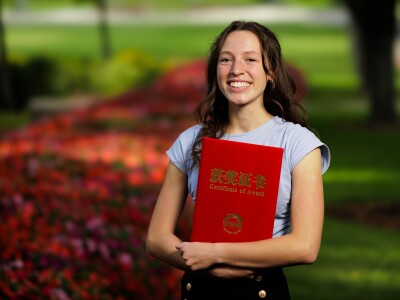BYU humanities courses set students up for success in job interviews

Highly formalized and conservative, Japanese business culture can be challenging for Americans to navigate. Interviewees at a Japanese company need to know, for example, to wait by the door until invited in and to then say the ritualized phrase “shitsurei shimasu,” meaning “excuse me, thank you for having me,” before entering the room, closing the door, bowing and taking a seat.
Among American undergraduates, BYU students studying Japanese are uniquely prepared to thrive in this job market. For the past two years, through a semester-long, one-credit-hour course, BYU Japanese professor Steve Moody has meticulously prepared a group of seven to eight students to attend the Boston Career Forum for Japanese-English bilinguals. Big-name companies that regularly participate include Amazon, Bank of America and Nintendo, as well as powerhouse Japanese companies like SoftBank and Sumitomo.
Both years at the forum, all the students interviewed with recruiters, and half received job offers. Two of the students who attended last year’s forum in November are accepting jobs in Japan.
“Most of the people who attend the career forum are Japanese, so when an American shows up, there’s often a reaction of, ‘Oh, this is going to be someone who doesn’t really know anything and just thinks Japan is cool,’” Moody said. “But our BYU students are not that way — our students are focused and prepared, so they stand out and get through that first barrier with recruiters.”

Largely because of the prep course Moody developed, BYU is one of the organizations that sends the most non-native Japanese speakers to the career forum. Moody was inspired to create the course when he realized that even though BYU students studying Japanese could take advanced language courses and the department’s Japanese business class, and even though many had served missions in Japan, they still weren’t fully prepared for the Japanese work culture.
“The students will hear about Japanese business manners in the classroom, but when they graduate, they may have just enough knowledge to offend everybody without quite getting it right,” Moody said. “Sending them to Boston where they talk to actual company recruiters, it’s real-world, it’s high stakes — you’ve got to be on your game. At the same time, if you do flub it, you’re still a student with time to find a job, and you can use that experience to be more successful in the future.”
The several hundred companies that participate in the fair post on the forum’s website ahead of time. Although all the jobs require Japanese fluency, they are in a range of fields, including finance, marketing and engineering. The students can send in resumes and may be invited for scheduled, formal interviews at the fair; they also drop by company booths for informal talks.
For the prep course, Moody collaborates with the BYU Career Center and the Liberal Arts Advisement Center. Students prepare for the forum by building resumes and writing personal statements, learning from visiting alumni about their experiences working in Japan, researching companies and practicing interviews. They all receive a grant to fund their trip to Boston near the semester’s end.
“My preparation at BYU made the experience a lot more enjoyable once I arrived at the forum,” said engineering student Shule Thoreson, who received additional travel funding from a scholarship offered by the Boston Career Forum, a testament to his preparation.
Once there, Thoreson scored two offers for jobs in Tokyo. “I’d already prepared resumes and interviews, so I could just focus on networking in Japanese. It helped me reached my long-term goal of finding an engineering job in Japan, something that I initially had no idea how I would do.”
The career forum course is just one experiential learning opportunity available to Japanese students. Undergraduates fluent in Japanese can also teach introductory and intermediate Japanese at BYU, with training and supervision offered by the department.
“I remind these students how blessed they are to be able to teach while at BYU,” said Japanese professor Shin Tsuchiya, who mentors undergraduate teachers in the program. “I’ve never met anyone else in my profession outside BYU that trusts undergraduates to teach. It’s very unique. When they teach, they are practicing elements of professional work that can later be applied in many fields.”
The focused, fine-grained preparation the career prep course offers is also a hallmark of experiential learning in BYU humanities more broadly. For example, students can take one-credit-hour courses to prepare applications for Ph.D. programs in the humanities, to edit student journals for hands-on experience or to learn the ropes of local government working with Provo City planners on community projects.



